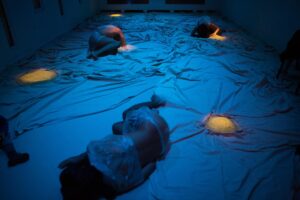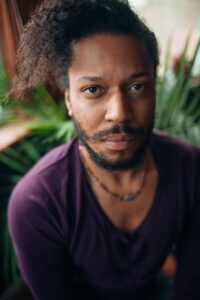
Makini: Transitions into TERRESTRIAL
Tuesday, March 12 | 5:30-7pm
PAHB Room 234
Positioned at the base of the furthest extended toe of a body of new work, I am remembering how discomforting it is to be at the start of something. Traveling backwards into the darkness of the unknown, my eyes regarding the hazy fullness of the past, I am asking my eyes to trust the rest of my sensorial body. Of this body that relies so heavily on sight, I ask for trust in the truth that my eyes do not contain the most important sense in this moment. It is a moment of saying goodbye to over a decade of thought and practice and movement, of powerful communities of collaborators, of finding ourselves in places in which we ought not to be, of learning how to belong and to be belonged to. It is also a moment of wondering what it is that I even believe anymore about the notion of belonging.
As I archive a decade’s worth of work centered around Black majorette performance, I turn my attention to the ground that holds the bodies that shimmy over top of it. In a new body of work, tentatively titled terrestrial, I am most curious about we, humans, as Earth, as opposed to on the Earth, or with the Earth. I am making proposals for the range of methods with which we can deal with the vastness of time — far beyond the containers of white supremacy and settler colonialism, and possibly beyond their antecedents, and the antecedents of those antecedents. How do these bodies already contain the epic and the unforeseen of the planet? What does that have to do with how we seek expertise in the forms that we create?
Makini will also be leading a dance workshop for students on March 11 & 13 from 2:30-4:40. Space is limited. Please contact the dance department if you are interested in participating.

Bio: I am a choreographer, performer, and video artist, based between traditional lands of the Tutelo-Saponi speaking peoples and lands of the Lenape peoples, who grew up dancing around the living room and at parties with my siblings and cousins. My early exposure to concert dance was through African dance and capoeira performances on California college campuses where my Pan- Africanist parents studied and worked, but I did not start “formal” dance training until college with Umfundalai, Kariamu Welsh’s contemporary African dance technique. My work continues to be influenced by various sources, including my foundations in those living rooms and parties, my early technical training in contemporary African dance, my continued study of contemporary dance and performance, my movement trainings with dancer and anatomist Irene Dowd around anatomy and proprioception, my sociological research of and technical training in J-sette performance with Jermone Donte Beacham. Through my artistic work, I strive to engage in and further dialogues with Black queer folks, create lovingly agitating performance work that recognizes History as only one option for the contextualization of the present, and continue to encourage artists to understand themselves as part of a larger community of workers who are imagining pathways toward economic ecosystems that prioritize care, interdependence, and delight.